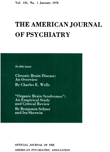The role of humor and folklore themes in psychotherapy
Abstract
In the alternation of deconstitution and constitution that is fundamental to human life, humor has a useful role, mainly as a deconstituting force, whereas folklore emphasizes the revitalization of existence. Yet humor can be harmful in situations where there is a lack of mutual respect, and it can be growth-retarding if it becomes a substitute for needed change. The effectiveness of humor and folklore themes is proportional to the genuineness of the interpersonal relationship. In folklore, humor reinforces the injunction to seek wider worlds beyond the one that has become monotonous and stifling. Humor and folklore themes can, therefore, prove helpful when used judiciously in psychotherapy.
Access content
To read the fulltext, please use one of the options below to sign in or purchase access.- Personal login
- Institutional Login
- Sign in via OpenAthens
- Register for access
-
Please login/register if you wish to pair your device and check access availability.
Not a subscriber?
PsychiatryOnline subscription options offer access to the DSM-5 library, books, journals, CME, and patient resources. This all-in-one virtual library provides psychiatrists and mental health professionals with key resources for diagnosis, treatment, research, and professional development.
Need more help? PsychiatryOnline Customer Service may be reached by emailing [email protected] or by calling 800-368-5777 (in the U.S.) or 703-907-7322 (outside the U.S.).



